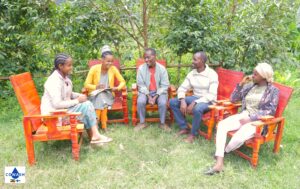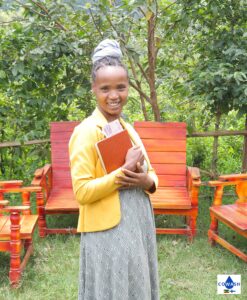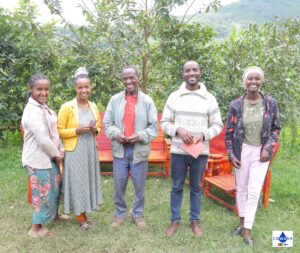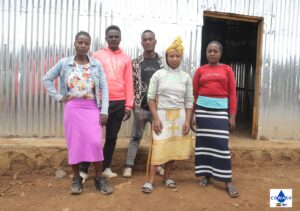Women play a critical role in managing water resources and ensuring the health and well-being of their communities. Recognizing this, COWASH IV is committed to empowering women to take leadership positions in WASH facilities construction and management.
Through its Community Managed Project (CMP) approach, COWASH IV places decision-making power directly in the hands of communities. At the heart of this model are WASH Committees (WASHCOs), which are responsible for planning, implementing, and managing WASH projects. The project prioritizes the inclusion of women in WASHCOs, aiming for at least 50% female membership and encouraging communities to select women with the necessary skills and knowledge for leadership roles.
 COWASH IV provides comprehensive training on leadership and the CMP approach to equip women with the necessary skills to excel in their roles. The project also develops and distributes guidelines and manuals to support their work.
COWASH IV provides comprehensive training on leadership and the CMP approach to equip women with the necessary skills to excel in their roles. The project also develops and distributes guidelines and manuals to support their work.
 Mestawet Mengistu, a treasurer from the Abaye Boreta Community Water Supply WASHCO in Wondo Genet Woreda, highlights the positive impact of this approach on her leadership development and community involvement. She emphasizes the importance of empowering women to participate in such committees, enabling them to address their challenges directly and develop their skills.
Mestawet Mengistu, a treasurer from the Abaye Boreta Community Water Supply WASHCO in Wondo Genet Woreda, highlights the positive impact of this approach on her leadership development and community involvement. She emphasizes the importance of empowering women to participate in such committees, enabling them to address their challenges directly and develop their skills.
The WASHCO from Abaye Boreta is currently responsible for administering the Abaye Boreta Spring Water Supply System and working to build a community water point that will benefit 67 households. The committee holds regular meetings, collects monthly contributions, and maintains a savings account. They also actively promote awareness about hygiene, and the benefits of community water points, and encourage community contributions for WASH projects.
Empowering women as WASHCO leaders is crucial for the sustainable management of community water points. Women often bear the primary responsibility for water collection in rural communities and possess a deep understanding of water needs and challenges, making them ideal advocates. Their involvement in WASHCOs ensures that water supplies are managed effectively, with close attention to maintenance and repair, guaranteeing the sustainability of community water points. Moreover, by taking on these leadership roles, women gain valuable experience, positioning them for future leadership opportunities within their communities and beyond.
 Abebayheu Campa, a member of the Abaye Boreta WASHCO, shares her experience of developing her leadership skills through her involvement in the committee. She appreciates the project’s community-led approach, which has empowered her community to effectively address their WASH needs.
Abebayheu Campa, a member of the Abaye Boreta WASHCO, shares her experience of developing her leadership skills through her involvement in the committee. She appreciates the project’s community-led approach, which has empowered her community to effectively address their WASH needs.
Beyond water points, COWASH IV promotes women’s leadership in WASH Savings and Loan Associations and Market-Based Sanitation Supply Centers programs. The project requires membership and encourages women to take on leadership roles in these initiatives, fostering women’s empowerment and creating opportunities for women-led businesses in the sanitation sector.
A prime example of this initiative is the Roori Market-Based Sanitation Supply Center (MBSC) in Sidama’s Chrione Woreda. The MBSC has three women among its five members, with two of them in leadership positions. The project provided training for the members, helping them to develop their leadership skills and effectively address the sanitation supply needs of the community.
